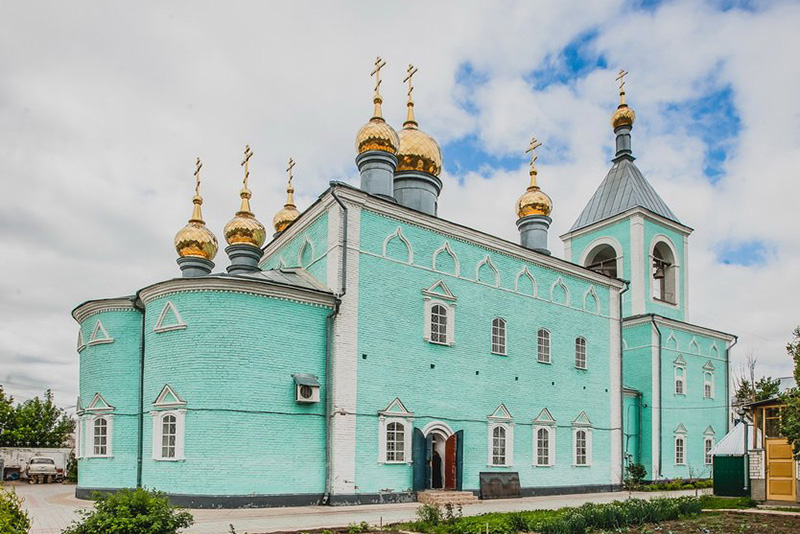
Speech by Metropolitan Alexander of Astana and Kazakhstan at the international scientific and practical conference "Regent Service in the Metropolitan District. Path to Mastery"
- 20.10.2024, 12:56
- Новости на английском языке

I cordially greet all of you - the organizers, participants and guests of the International scientific and practical conference "Regent Service in the Metropolitan District. Path to Mastery".
With the blessing of His Holiness Patriarch Kirill of Moscow and All Rus', the 1st International Congress of Regents and Singers was held in the Russian capital at the end of 2016. The main result of this spiritually and culturally significant forum was the formation of the Church and Public Council under the Patriarch of Moscow and All Rus' for the Development of Church Singing. Thanks to the work of the council and holding two more international singing congresses, the discussion of pressing topics and issues related to the choirmaster's work and liturgical singing has intensified and continued at various levels - church-wide, diocesan and parish. The topic of Orthodox musical art does not leave unconcerned either the hierarchs, or the clergy, or the parishioners, since singing in the temple is an integral part of the Tradition of the Church of Christ, an essential component of spiritual life and one of the important and expressive forms of modern church mission, which has liturgical, educational and cultural dimensions.
Our conference is a good opportunity to discuss practical and theoretical issues of church music and performing skills in the Kazakhstan Metropolitan District; we can delve into the history of Orthodox singing traditions and exchange professional experience. Before outlining a number of topical issues of liturgical singing, I would like to remind you that the work of a choir director is a service to God and people, a sublime calling that requires deep knowledge, high spiritual responsibility and a constant striving for perfection from the leader of a singing group. Both the choir director and the singer in the choir must remember and understand that liturgical singing is, first of all, a prayerful conversation between a person and God, it is a verbal sacrifice, a gift pleasing to the Creator, an expression of the impulse of a believing soul. According to the Gospel narrative, the first Christian hymn was brought to earth by angels on the night of the Nativity of Christ. The Savior himself and his disciples concluded the Last Supper by singing psalms: “When they had sung a hymn, they went out to the Mount of Olives” (Matthew 26:30), thereby sanctifying the ancient, Old Testament tradition. Christian worship from the first moments of its formation was filled with the singing of prayers, as evidenced by the Apostle Paul: "let us continually offer to God a sacrifice of praise—the fruit of lips that openly profess his name" (Heb. 13:15). He expressed himself even more clearly in the Epistle to the Ephesians: "Be filled with the Spirit, speaking to one another with psalms, hymns, and songs from the Spirit. Sing and make music from your heart to the Lord" (Eph. 5:18,19). Dionysius the Areopagite calls church singing a reflection of the singing of the Heavenly Powers - the angelic ranks, constantly praising the Lord. According to the divine plan, the Orthodox Liturgy is the unity of the Heavenly and earthly worlds, angels and people in worship of the Creator. Our chants include angelic hymns, which are mentioned in the Holy Scripture and Tradition. For example, the song of the Seraphim, whom the prophet Isaiah saw in a vision, is heard every time in the Eucharistic Canon: "Holy, Holy, Holy is the Lord Almighty! The whole earth is full of His glory!" (Isaiah 6:3). One of the most performed and famous hymns, the "Trisagion", was received from the angels.
Church singing not only musically accompanies or decorates the service, but is itself a melodic sermon, emotionally enhances the semantic content of public prayer, helps the listener perceive and remember doctrinal truths.
Based on the above, in order to develop the work of the choirmaster and improve liturgical singing, it is necessary, in my opinion, to pay attention to the solution of the following issues. Firstly, the choirmaster must be educated not only from the point of view of musical science, but also possess a sum of theological knowledge, understand liturgical texts, understand liturgical science and the statute, and be proficient in Church Slavonic. The spiritual education and churching of the singers is also the task of the choirmaster, which is no less important than maintaining a high level of performing skills in the team. In educational and upbringing activities, the choirmaster must rely on the clergy, find support from the clergy in this difficult work. In this regard, it is necessary to note the importance of complete mutual understanding and cooperation between the choir and the altar.
The choirmaster should consult with the rector of the church on issues of repertoire, volume, tempo and other features of the performance. All relations in the parish should be built on Christian love and first of all - between the priests and the clergy.
Secondly, singing in our churches must be restored to a prayerful spirit and mood. The distortion and secularization of church music is an ancient disease. The 75th rule of the Sixth Ecumenical Council, which took place in 692, states: “We wish that those who come to church to sing would not use unruly cries, would not force themselves to make unnatural shouts and would not introduce anything inappropriate and alien to the Church. But with great attention and tenderness would they offer singing to God, who watches over the hidden.” The secularization of liturgical singing caused deep concern among a number of outstanding hierarchs and ascetics of piety, who wanted to preserve the strictly ecclesiastical spirit of liturgical singing. The ever-memorable His Holiness Patriarch Alexy I, who made many efforts to restore the liturgical order and decorum in our Church after decades of cruel godless persecution, reasoned on this topic as follows: “Why should we chase after tasteless, from the church point of view, imitation of secular singing, when we have amazing examples of old church singing, sanctified by time and church traditions.” “The performance of church hymns in the loud tone of secular romances and passionate opera arias,” said the Patriarch, “does not give the worshipers the opportunity not only to concentrate, but even to grasp the content and meaning of the hymns.”
He called: “We must do everything possible to drive the worldly spirit out of our church singing.”
A believer expects prayer from a church service and not vocal experiments or a virtuoso concert. Slow, calm, peaceful singing in the church brings the worshipers closer to God. The choirmaster who tries to draw all the worshipers' attention to the sound of his group is wrong. Church singing is not intended to distract the worshipers with its performance, but to promote communion with God and to elevate the souls of those standing in the church to Heaven. In order for the singing to be correct, truly traditional and churchly, the choirmaster and the singers must understand the meaning of the text being performed and pray themselves. The ever-memorable head of the choirmaster school of the Moscow Theological Academy, Schema-Abbot Nikon (Smirnov), said: "When the choirmaster prays, the choir prays. When the choir prays, the church prays."
Thirdly, each choirmaster, based on the capabilities of his group, objectively assessing the level of vocal skills and musical literacy of the singers, must decide on the repertoire. The range of musical genres and styles is unusually wide. Here, a good knowledge of church singing traditions, tact and wisdom are necessary to avoid extremes. A novice choirmaster is spurred on by the danger of being carried away by ancient chants, Znamenny or Byzantine chant, which is difficult for most modern parishioners to perceive, on the one hand and by indiscriminate immersion in parts, copying beautiful, but absolutely secular music, pleasing the ear, but giving nothing to the heart.
The solution of all the above-mentioned issues and the study of other relevant topics of church musical art, liturgical singing and choirmaster's work are the tasks of our conference today and, I hope, a number of subsequent scientific and practical events of this kind. We all need to formulate a program of action for the development and strengthening of singing groups of the dioceses of the Kazakhstan Metropolitan District. The exchange of opinions, experience and knowledge will further help choirmasters and singers to feel the importance of serving God and people in the field of sacred music.
For two thousand years, church singing, combining music and words of prayer, has affected people with its gracious power – it elevates the soul above the earthly, heals spiritual ailments, eases sorrows, helps a person feel the beauty of the Heavenly Kingdom. “Sing to our God, sing; Sing to our King, sing” (Psalm 46:7). I wish everyone fruitful work and useful communication. May God's blessing be with you all.





















